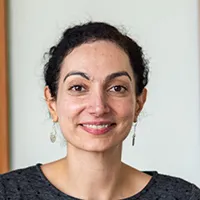Three Steps to Finding Your Mentor
Obtaining effective mentorship is integral to achieving your goals while you are here at UCSF and beyond. Mentorship is a relationship in which a person is actively involved in the personal and professional development of another.
In the final month of President Barack Obama’s presidency, he captured the importance of mentorship in his presidential proclamation:
“Nobody succeeds on their own: each young person's strength and resilience is fostered by those who have taught them they can do anything they put their mind to. Whether helping mentees study for a test, learn a new skill, or lift their heads up after a setback, mentors provide them the chance they need to move forward and set their sights even higher. And in helping mentees achieve their goals, mentors can inspire them to reach back and provide the same support to someone else in need of a mentor.”
January is National Mentorship Month. In honor of National Mentorship Month, here are 3 steps to help you gain a mentor:
Step 1: Create Goals
The most important part of the mentorship process is through creating clear and specific goals. When creating your goals, ask yourself these two questions:
- What is the area that I need to work on to be successful?
- What specifically would I like from a mentor to help me be successful in that area?
For example, in a recent career counseling session, I worked with a nursing student whose goal was to be a better public speaker.
When asked to further clarify this goal, she determined that she wanted to gain skills on how to better engage with audience members.
Once she identified this goal, we brainstormed the type of support that she would like from a mentor. She realized that there were two ways that a mentor can help her achieve this goal:
1) regular meetings to discuss strategies for engaging with audience members
2) an opportunity for the mentor to observe, and provide feedback, on her ability to engage with the audience.
As a result of taking the time to create clear and specific goals, the student said that it helped her identify the appropriate individual to approach about mentorship.
Step 2: Identify Potential Mentors
Once you have created your goal, the next step is to determine who can help you accomplish it. We commonly view professors, advisors, upperclassmen, preceptors, and principal investigators as potential mentors.
It also helps to think outside the box when determining who can support you. For example, UCSF alumni can serve as excellent mentors because, at one point in their lives, they were in a similar position as you and may relate to many of the issues you are currently addressing.
Because of that, they can give you tailored and nuanced support — from providing advice on how to succeed at UCSF to providing guidance as you explore career paths. Professionals outside of your field can also provide effective mentorship.
Inter-professional collaborations have become common (and essential) in a variety of fields including healthcare.
As such, a mentor in another discipline can introduce you to new and diverse opportunities, and give you an opportunity to explore an issue from a different lens.
Step 3: Determine where to find your Mentor
There are countless places to find a mentor. Because of that, we suggest using a variety of methods to find them — from seeking in-person opportunities to using online resources.
Mentors can be found in your clinical rotations, labs, and registered campus organizations. You can also meet potential mentors at professional conferences and networking events.
In addition to these in-person opportunities, UCSF Connect is an excellent online resource that can help you find mentors. UCSF Connect is an online networking platform that connects you to members of the UCSF community including other students, alums, faculty, postdoctoral scholars, and residents.
Through joining UCSF Connect, you can seek mentorship opportunities, gain career advice, and connect with other users.
With over 1,400 users, there are ample opportunities to find and connect with mentors. Dr. Gabriela Monsalve, Program Director of the Motivating Informed Decisions (MIND) Program at UCSF, discussed the value of UCSF Connect’s mentorship feature in a recent interview:
I love the mentoring capabilities of UCSF Connect. You get to decide with whom you want to connect, and you can mentor (or be mentored) all within the convenience of the platform. Moreover, UCSF Connect will allow you to identify multiple mentors, from anyone in your career(s) of interest, to people that you admire and just want to get to know better. In this way, you can acquire the knowledge that you need from a variety of independent sources, rather than just relying on people within your immediate sphere of influence.
If you need support on the process of identifying or finding a mentor, or how to use UCSF Connect, feel free to make an appointment with the Office of Career and Professional Development (OCPD).
In addition, OCPD will also be collaborating with First Generation Support Services on a Finding Your Mentors workshop. It will be held on Jan. 29 from noon to 1 p.m. More information about the workshop, including how to register, can be found here.



